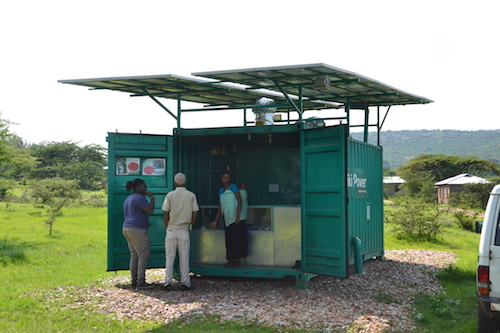By John-Henry Holtzkamp
While Africa is the world's second-largest and second-most-populous continent, it is the most “electricity poor” region in the world. With its estimated population of 1.2 billion people, most of the people live in areas where connecting to a local power grid is impossible due to the extremely remote location of most villages.
To bring electricity to these regions, battery-based microgrid systems powered by solar, wind and hybrid renewable energy sources, are successfully providing reliable electricity where grid expansion is not an option.
Established by E.ON Off-Grid Solutions GmbH, Rafiki Power, which means “friendly power” in Swahili, is establishing solar PV and battery-based microgrids in Africa for households, businesses and local law enforcement that previously had no access to electricity. The Rafiki Power system was installed in a container, locals dug the trenches for the distribution grid, and home and business were connected. Customers pay pay for access to electricity via their cell phones.
he Rafiki Power kiosk in the village of Ololosokwan in Tanzania. Credit: Rafiki Power.
In addition, the container serves as a kiosk within which local entrepreneurs can set up shops.
The company recently installed Trojan Solar AGM batteries as the energy storage solution for a village microgrid in Ololosokwan, Tanzania.
The total solar system capacity for the microgrid is 6 kWp provided by 24 250-W Lorentz panels. E.On Off Grid Solutions installed eight Trojan Solar AGM deep-cycle, advanced lead acid batteries in 2 parallel strings of 4 batteries in series per string. The batteries have an expected design life of 8 years according to the IEC 61427 testing standard. A MultiPlus 5kVa inverter and a Blue Solar MMPT charge controller both from Victron round out the system. The system arrives in a container
The microgrid has increased the standard of living of the residents, expanded education, and enhanced overall economic development.
One of the flourishing businesses in Ololosokwan, is Maasai Honey, which was established to provide an opportunity for the women in the village to create a business they could manage and profit from. The beekeeping project — which is run by a coop — focuses on teaching the local Maasai women how to harvest honey and provides them with a sustainable income.
The implementation of the microgrid by Rafiki Power enabled Maasai Honey to access consistent electricity to power its business operations, such as lighting and computers. Future plans include integrating electricity with the honey processing operation to enhance and expand honey production.
Trojan’s Solar AGM lead acid batteries were selected as the energy storage solution for the microgrid. With a total of 18 kWh of storage and 6 kWp of PV capacity, the microgrid supplies Ololosokwan with electricity day and night. The Trojan Solar AGM batteries feature a non-spillable, maintenance-free design, which is important to ensure safety and longevity of the battery bank.
Trojan’s Solar battery line incorporates a wide range of technical features including a proprietary paste, plate design and separators for overall extended lifecycle, which is optimized for total cost ownership. In addition, Trojan’s new deep-cycle Solar AGM batteries are temperature tolerant, shock and vibration resistant and have a low internal resistance for higher discharge current and higher charging efficiency, which are features that are needed in the harsh and demanding environments that characterize off-grid as well as grid-connected systems with frequent cycling needs.
Asset Monitoring and Management
To operate the microgrid most efficiently Rafiki Power developed and implemented the Asset Monitoring and Management Platform (AMMP), a software platform that ensures effective management of asset operations. The platform integrates all data streams from the different microgrid equipment suppliers, providing a hierarchical structured dashboard with real-time insights and alarms.
Locals support the excavation efforts to lay down the power lines. Credit: Rafiki Power.
The AMMP allows the team to monitor system assets in a single screen, illustrating the state of each asset including PV, battery, generator, communications equipment, smart meter data and more. The Rafki Power team said the system has improved microgrid operations and troubleshooting, as well as data analysis of assets. Rafiki Power has made AMMP available to third parties, with several on-going pilots already.
Immeasurable Benefits
Not only do microgrids provide much needed access to electricity for households and schools, they also enable the communities like Ololosokwan to establish and expand business opportunities.
In addition, AMMP allows for the monitoring of daily microgrid operations, including the performance and health of the Trojan batteries. The data gathered enables the Rafiki Power team to proactively address potential problems, such as preventing deep battery discharges and averting high operating temperatures, before they become serious issues. Collected data is also used for reporting on daily operations and providing information that can be used to continually improve the system design.
“Overall, the standard of living in the village has improved significantly now that customers can light their homes and businesses can power their operations,” said Hendrik Broering, Asset Operation & Engineering, E.ON Off Grid Solutions with Rafiki Power.
“The energy storage provided by Trojan batteries has expanded education and enhanced overall economic development.”
A bank of Trojan Solar AGM batteries provides storage for the microgrid. Credit: Rafiki Power.
Author John-Henry Holtzkamp is a technical sales engineer at Trojan Battery Company.



